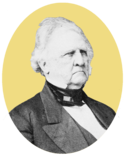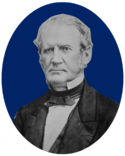| 1852 presidential election | |
  Nominees Scott and Graham | |
| Convention | |
|---|---|
| Date(s) | June 16–19 & 21, 1852 |
| City | Baltimore, Maryland |
| Venue | Maryland Institute for the Promotion of the Mechanic Arts (now Maryland Institute College of Art) |
| Chair | John G. Chapman |
| Candidates | |
| Presidential nominee | Winfield Scott of New Jersey |
| Vice-presidential nominee | William A. Graham of North Carolina |
| Voting | |
| Total delegates | 296 |
| Votes needed for nomination | 149 |
| Results (president) | Scott (NJ): 159 (53.72%) Fillmore (NY): 112 (37.84%) Webster (MA): 21 (7.09%) Blank: 4 (1.35%) |
| Results (vice president) | Graham (NC): 296 (100%) |
| Ballots | 53 |
The 1852 Whig National Convention was a presidential nominating convention held from June 16 to June 21, in Baltimore, Maryland. It nominated the Whig Party's candidates for president and vice president in the 1852 election. The convention selected General-in-Chief Winfield Scott (commanding the United States Army and led in the recent war with Mexico) for president and U.S. secretary of the navy William A. Graham for vice president.
In the aftermath of the Mexican–American War (1846–1848) and the Compromise of 1850, the Whig Party was torn over the issue of slavery. President Millard Fillmore, who had succeeded to the presidency in July 1850 after the death of Zachary Taylor, had the strong backing of Southern Whigs. However, his enforcement of the Fugitive Slave Act of 1850 had alienated many Northern Whigs, who supported either Scott or secretary of state Daniel Webster. Scott and Fillmore essentially tied on the first presidential ballot, while a smaller fraction of the vote went to Webster. There was little delegate movement over the next 46 ballots, but Scott gained momentum on the 48th ballot and clinched the nomination on the 53rd ballot.
Graham, Edward Bates of Missouri, and James Pearce of Maryland all won significant support on the first vice presidential ballot, but Graham clinched the nomination on the second ballot. In the general election, Scott and Graham were defeated by the Democratic candidates, Franklin Pierce and William R. King, who took office the following March 1853. This 1852 convention was the last Whig Party presidential convention to be held independent of other parties, as the 1856 Whig National Convention was held by a rump faction of Whigs and nominated the ticket previously selected by the competing 1856 American National Convention.